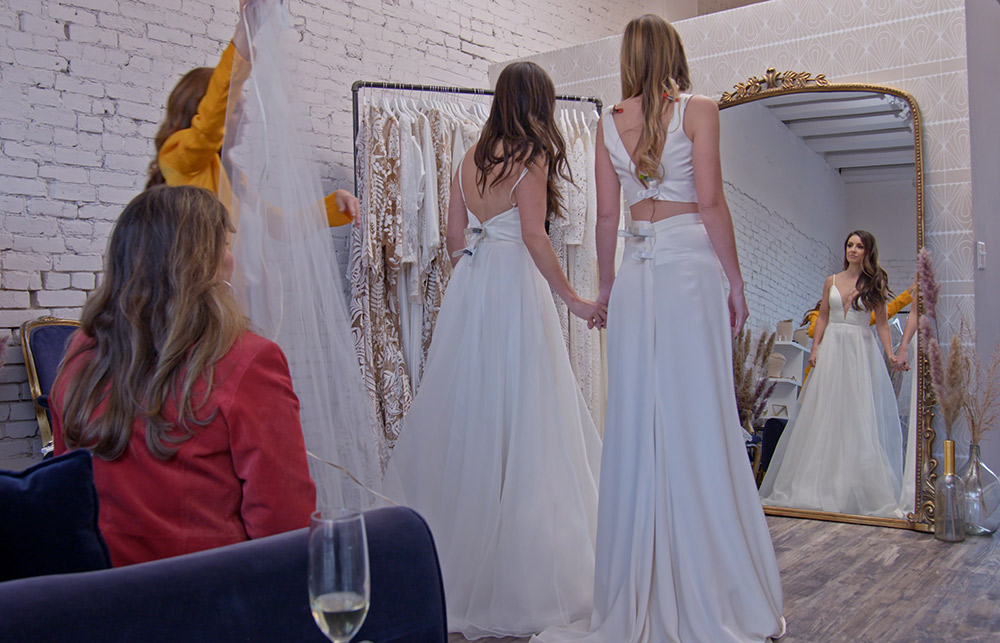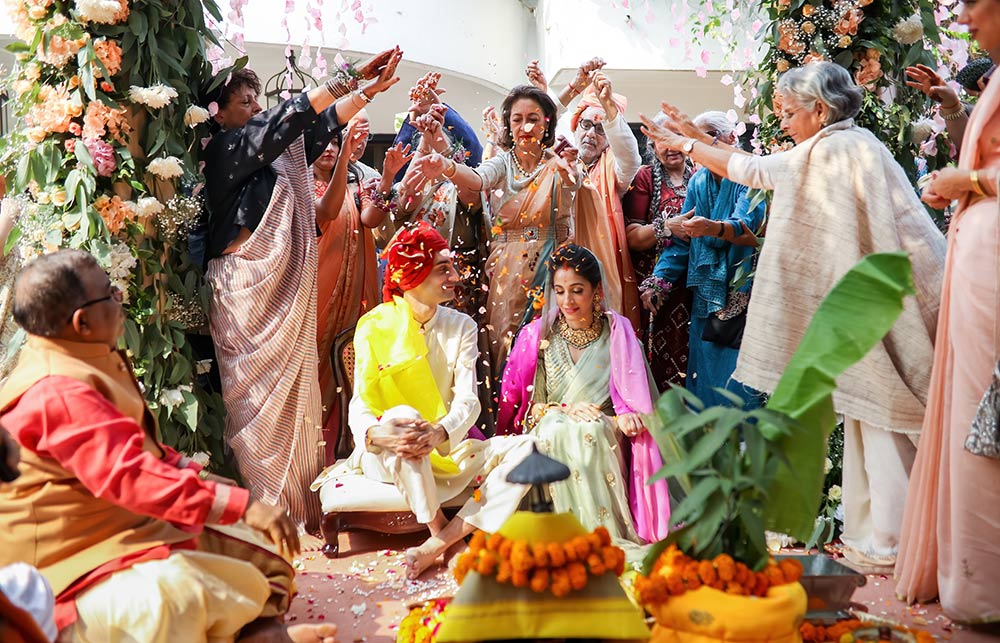先举办婚礼还是先买房?美国情侣也有同样的苦恼
艾米丽和布拉克斯顿是一对20出头的情侣,对于买房还是举办婚礼,他们一时拿不定主意。布拉克斯顿想买房,他不想与爱人分开生活。目前,他们各自跟父母住在自己家里。
在认真对比买房和举办婚礼仪式的各项细节之后,这对新人最终决定花3万美元举办婚礼。他们仍然和父母住在一起。
奈飞(Netflix)新推出的真人秀节目《举办婚礼还是按揭买房?》(Marriage or Mortgage)共邀请了10对情侣,艾米莉和布拉克斯顿是其中的一对,婚礼策划人莎拉•米勒与房地产经纪人尼科尔•霍姆斯展开角逐——在花3万美元举办婚礼还是买房之间,看看情侣们最终会如何选择?
该节目提出了一个很受关注,同时也令人生畏的问题:你会用你的数万美元积蓄买一栋婚后居住的房子,还是用它来举办只能持续一天的婚礼呢?
霍姆斯在接受《财富》(Fortune)采访时说:“如果一对情侣有能力同时承担举办婚礼和买房的费用,完全可以两者兼顾。但这10对情侣并非都是此种情况。他们时常为钱苦恼。”

该节目的策划方案很出色,节目组在纳什维尔及周边地区邀请了几对讨人喜欢的情侣参加节目。他们中有年长的,有年轻的,有混血儿,也有同性恋。这些情侣看起来都很快乐,但他们在各自的关系中也存在一些问题。另外,拍摄外景地选在纳什维尔,这个地区本身也存在一些问题:随着科技和医疗行业的发展,纳什维尔的婚礼市场蓬勃发展,人口持续增长,中间房价也在不断上涨。
节目组给每对情侣的预算都一样:3万美元。The Knot提供的数据显示,新冠疫情前,在美国举办一场婚礼平均花费28,000美元左右,这还不包括婚戒或蜜月费用。人们一般在20多岁就会结婚,对于大多数人来说,这笔钱是一笔不小的开销。相比之下,Zillow提供的美国平均住房估值不到27万美元。如果首付10%按揭买房,购房者需先付款27,000美元。对于可能在30多岁时才能攒下这笔钱的情侣来说,举办婚礼还是按揭买房是无法回避的一个冲突。
如果经济条件允许,可以选择买房。这确实是一项投资,因为选择买房的这对情侣将会积累财富,在出售房屋时会得到投资回报。而租房则会让钱进入一个你无法收回的黑洞。但让每个人都做出理性的财务决定是不切合实际的。我们是人,我们也会做出情绪化的购买决定。再加上来自社会的压力,会促使准新娘倾向于选择举办一场“盛大的婚礼”,让自己感觉像公主一样。无论是在奈飞真人秀节目中还是在现实生活中,我们都能看到情侣们的这种倾向。

米勒说:“婚礼是承诺的象征,在我们开启下一段人生之前,还有其他更好的方式来实现这一点吗?我很尊重传统习俗,大多数年轻情侣们可能已经忘记了父辈和祖辈们的信仰。考虑其他事情之前,还是先让彼此的爱紧密相连吧。”
节目并未呈现每个决定是多么的错综复杂,尤其是婚礼仪式和宾客招待事务中的细节。婚礼主题似乎只侧重于三个关键部分,这难免让观众怀疑他们是否考虑过大家关注的其他方面,如摄影师、鲜花、调酒师,甚至是着装。
婚礼策划完全基于两个错误的假设,这两个假设使很多没有参加节目的情侣备受困扰:一是结婚就得举办婚礼;二是婚礼是一种投资。首先,即使是没有大量宾客的盛大婚礼仪式,也照样能结婚。在大多数州,领取结婚证差不多只要25美元,剩下的29,975美元则可以作为买房首付。和大多数人认为的并不一样,先领结婚证,以后再举办婚礼,这种情况更加普遍。也就是说,任何一对情侣都可以先领证,然后买房子,将来再举办婚礼。
在你的朋友和家人面前做出婚姻承诺是很重要的,米勒不断提醒情侣们,婚礼可不仅仅只是一场聚会。她可能会试图用直升机巡游和定制礼服吸引宾客们来参加婚礼,但她的本意其实是让那些相信这对情侣彼此相爱的人们出席现场。
尽管人们常把婚礼称为投资,但这种说法并不恰当。婚礼可以给人留下美好的回忆,确实有情感价值,但这不是投资。正如霍姆斯所说,“放生斑鸠或乘马车去看夕阳这种浪漫的事不可能赚到钱。”变卖婚礼仪式上的用品所得,根本不及你当初买它们时所花费的钱,更不可能增值,但房子可以。例如,据点对点转售市场的Tradesy提供的数据显示,即使你在网上出售婚纱,所得也仅有其零售价的一半左右。但大多数房子,尤其是在像纳什维尔这样处于经济增长的地区,投资一套房产,你会因为升值而赚钱,至少也能保值。

在情侣们决定举办婚礼还是买房之前,米勒和霍姆斯都在想方设法说服他们,比如供货商折扣和免费赠品等,这种事在镜头外究竟发生了多少次,我们不得而知;毕竟,想让观众看到多少,是奈飞的自由。其中的大多数情侣很可能只能通过这些折扣交易才能花3万美元举办一场梦幻婚礼。
他们的要求看起来与杂志和社交媒体上的婚礼内容并无二致;但据知情人士透露,大多数婚礼的费用可能高达六位数甚至更高。如果新娘有10万美元婚礼预算,那么一件价值6,000美元的婚纱可能只是九牛一毛。但如果预算只有其20%,还要宴请150名宾客,情况就完全不同了。同样,霍姆斯设法让房主为昂贵的Smeg家电准备预算。仅一台入门级冰箱就要2,000美元。如果这些是真的,我都想跟她合作了。
该节目的收益与奈飞推出的另一个婚礼系列真人秀节目《大日子》( The Big Day)形成了鲜明对比。参加《大日子》的是来自印度的情侣们、他们的婚礼策划人以及数千名嘉宾,几天之内就举办了多场活动,有时甚至在不同的国家举办了两场婚礼。《大日子》共三集,情侣们面对的挑战是,如何在不同的宗教或传统背景下走到一起,有两对情侣完全取消了传统的印度教婚礼仪式。但对这些情侣来说,钱不是问题,他们的父母已经为他们积蓄多年,完全有能力举办盛大的婚礼。
《大日子》确实汇聚了一场最完美的梦幻婚礼的全部亮点:豪华的装饰,人潮拥挤的舞池,从世界各地飞来的朋友,以及不惜一切举办一场梦幻婚礼的家人。一位新娘的父母一年前就种了几十株芥菜,让婚礼看起来就像一部非常受欢迎的印度电影《勇夺芳心》(Dilwale Dulhania Le Jayenge)里的场景。还有一家聘请了两位宝莱坞明星在婚礼仪式入口处客串出场。另一位新娘和她未来的小姑子与著名设计师高拉夫•古普塔在他的新德里工作室合影。谁来买单?当然是新郎的父母,他们还送给新娘一条搭配礼服的珍珠钻石项链。

在上述两档节目中,多数情侣想要表达的一个想法是:无论有没有钱,他们都“值得”拥有一场梦幻婚礼。新人们大多有这种权利感,这就引发了一个问题:这种电视娱乐节目对思考自己未来的人有什么影响?这就像是人们对婚礼、婚姻、理财知识和自有住房的一种长久误解。这会让人想起整个婚礼贷款行业中的那些房贷小作坊,像Upstart这样的公司,推销他们为婚礼提供的贷款(利率有时很高),而Maroo则提出帮助情侣用分期预付等方法,为举办婚礼提供资助。
米勒说:“我所处的行业并不是为了让情侣们破产或负债,”世界各地的婚礼策划人都是如此。聘请婚礼策划人的好处很多,其中一个是为婚礼安排进行指导,尤其是在费用方面。“要善于规划,虚心听取意见。你会惊讶地发现你居然能负担得起某项费用,”她补充道。
幸运的是,参加《举办婚礼还是按揭买房?》真人秀节目的购房者和婚礼策划人的人数几乎各占一半。事实上,有一对情侣证明了你真的可以拥有一切:丹尼斯和尼古拉斯选择买房,几个月后,镜头变成了霍姆斯和米勒带着乔迁礼物来拜访。在他们的新家向节目主持人祝酒之前,尼古拉斯有意无意地说出“妻子”,丹尼斯则戴着婚戒。通过摄影师抓拍的镜头,我们看到这对夫妇穿着奢华的服装,住在他们梦寐以求的房子里。(财富中文网)
翻译:郝秀
审校:汪皓
艾米丽和布拉克斯顿是一对20出头的情侣,对于买房还是举办婚礼,他们一时拿不定主意。布拉克斯顿想买房,他不想与爱人分开生活。目前,他们各自跟父母住在自己家里。
在认真对比买房和举办婚礼仪式的各项细节之后,这对新人最终决定花3万美元举办婚礼。他们仍然和父母住在一起。
奈飞(Netflix)新推出的真人秀节目《举办婚礼还是按揭买房?》(Marriage or Mortgage)共邀请了10对情侣,艾米莉和布拉克斯顿是其中的一对,婚礼策划人莎拉•米勒与房地产经纪人尼科尔•霍姆斯展开角逐——在花3万美元举办婚礼还是买房之间,看看情侣们最终会如何选择?
该节目提出了一个很受关注,同时也令人生畏的问题:你会用你的数万美元积蓄买一栋婚后居住的房子,还是用它来举办只能持续一天的婚礼呢?
霍姆斯在接受《财富》(Fortune)采访时说:“如果一对情侣有能力同时承担举办婚礼和买房的费用,完全可以两者兼顾。但这10对情侣并非都是此种情况。他们时常为钱苦恼。”
该节目的策划方案很出色,节目组在纳什维尔及周边地区邀请了几对讨人喜欢的情侣参加节目。他们中有年长的,有年轻的,有混血儿,也有同性恋。这些情侣看起来都很快乐,但他们在各自的关系中也存在一些问题。另外,拍摄外景地选在纳什维尔,这个地区本身也存在一些问题:随着科技和医疗行业的发展,纳什维尔的婚礼市场蓬勃发展,人口持续增长,中间房价也在不断上涨。
节目组给每对情侣的预算都一样:3万美元。The Knot提供的数据显示,新冠疫情前,在美国举办一场婚礼平均花费28,000美元左右,这还不包括婚戒或蜜月费用。人们一般在20多岁就会结婚,对于大多数人来说,这笔钱是一笔不小的开销。相比之下,Zillow提供的美国平均住房估值不到27万美元。如果首付10%按揭买房,购房者需先付款27,000美元。对于可能在30多岁时才能攒下这笔钱的情侣来说,举办婚礼还是按揭买房是无法回避的一个冲突。
如果经济条件允许,可以选择买房。这确实是一项投资,因为选择买房的这对情侣将会积累财富,在出售房屋时会得到投资回报。而租房则会让钱进入一个你无法收回的黑洞。但让每个人都做出理性的财务决定是不切合实际的。我们是人,我们也会做出情绪化的购买决定。再加上来自社会的压力,会促使准新娘倾向于选择举办一场“盛大的婚礼”,让自己感觉像公主一样。无论是在奈飞真人秀节目中还是在现实生活中,我们都能看到情侣们的这种倾向。
米勒说:“婚礼是承诺的象征,在我们开启下一段人生之前,还有其他更好的方式来实现这一点吗?我很尊重传统习俗,大多数年轻情侣们可能已经忘记了父辈和祖辈们的信仰。考虑其他事情之前,还是先让彼此的爱紧密相连吧。”
节目并未呈现每个决定是多么的错综复杂,尤其是婚礼仪式和宾客招待事务中的细节。婚礼主题似乎只侧重于三个关键部分,这难免让观众怀疑他们是否考虑过大家关注的其他方面,如摄影师、鲜花、调酒师,甚至是着装。
婚礼策划完全基于两个错误的假设,这两个假设使很多没有参加节目的情侣备受困扰:一是结婚就得举办婚礼;二是婚礼是一种投资。首先,即使是没有大量宾客的盛大婚礼仪式,也照样能结婚。在大多数州,领取结婚证差不多只要25美元,剩下的29,975美元则可以作为买房首付。和大多数人认为的并不一样,先领结婚证,以后再举办婚礼,这种情况更加普遍。也就是说,任何一对情侣都可以先领证,然后买房子,将来再举办婚礼。
在你的朋友和家人面前做出婚姻承诺是很重要的,米勒不断提醒情侣们,婚礼可不仅仅只是一场聚会。她可能会试图用直升机巡游和定制礼服吸引宾客们来参加婚礼,但她的本意其实是让那些相信这对情侣彼此相爱的人们出席现场。
尽管人们常把婚礼称为投资,但这种说法并不恰当。婚礼可以给人留下美好的回忆,确实有情感价值,但这不是投资。正如霍姆斯所说,“放生斑鸠或乘马车去看夕阳这种浪漫的事不可能赚到钱。”变卖婚礼仪式上的用品所得,根本不及你当初买它们时所花费的钱,更不可能增值,但房子可以。例如,据点对点转售市场的Tradesy提供的数据显示,即使你在网上出售婚纱,所得也仅有其零售价的一半左右。但大多数房子,尤其是在像纳什维尔这样处于经济增长的地区,投资一套房产,你会因为升值而赚钱,至少也能保值。
在情侣们决定举办婚礼还是买房之前,米勒和霍姆斯都在想方设法说服他们,比如供货商折扣和免费赠品等,这种事在镜头外究竟发生了多少次,我们不得而知;毕竟,想让观众看到多少,是奈飞的自由。其中的大多数情侣很可能只能通过这些折扣交易才能花3万美元举办一场梦幻婚礼。
他们的要求看起来与杂志和社交媒体上的婚礼内容并无二致;但据知情人士透露,大多数婚礼的费用可能高达六位数甚至更高。如果新娘有10万美元婚礼预算,那么一件价值6,000美元的婚纱可能只是九牛一毛。但如果预算只有其20%,还要宴请150名宾客,情况就完全不同了。同样,霍姆斯设法让房主为昂贵的Smeg家电准备预算。仅一台入门级冰箱就要2,000美元。如果这些是真的,我都想跟她合作了。
该节目的收益与奈飞推出的另一个婚礼系列真人秀节目《大日子》( The Big Day)形成了鲜明对比。参加《大日子》的是来自印度的情侣们、他们的婚礼策划人以及数千名嘉宾,几天之内就举办了多场活动,有时甚至在不同的国家举办了两场婚礼。《大日子》共三集,情侣们面对的挑战是,如何在不同的宗教或传统背景下走到一起,有两对情侣完全取消了传统的印度教婚礼仪式。但对这些情侣来说,钱不是问题,他们的父母已经为他们积蓄多年,完全有能力举办盛大的婚礼。
《大日子》确实汇聚了一场最完美的梦幻婚礼的全部亮点:豪华的装饰,人潮拥挤的舞池,从世界各地飞来的朋友,以及不惜一切举办一场梦幻婚礼的家人。一位新娘的父母一年前就种了几十株芥菜,让婚礼看起来就像一部非常受欢迎的印度电影《勇夺芳心》(Dilwale Dulhania Le Jayenge)里的场景。还有一家聘请了两位宝莱坞明星在婚礼仪式入口处客串出场。另一位新娘和她未来的小姑子与著名设计师高拉夫•古普塔在他的新德里工作室合影。谁来买单?当然是新郎的父母,他们还送给新娘一条搭配礼服的珍珠钻石项链。
在上述两档节目中,多数情侣想要表达的一个想法是:无论有没有钱,他们都“值得”拥有一场梦幻婚礼。新人们大多有这种权利感,这就引发了一个问题:这种电视娱乐节目对思考自己未来的人有什么影响?这就像是人们对婚礼、婚姻、理财知识和自有住房的一种长久误解。这会让人想起整个婚礼贷款行业中的那些房贷小作坊,像Upstart这样的公司,推销他们为婚礼提供的贷款(利率有时很高),而Maroo则提出帮助情侣用分期预付等方法,为举办婚礼提供资助。
米勒说:“我所处的行业并不是为了让情侣们破产或负债,”世界各地的婚礼策划人都是如此。聘请婚礼策划人的好处很多,其中一个是为婚礼安排进行指导,尤其是在费用方面。“要善于规划,虚心听取意见。你会惊讶地发现你居然能负担得起某项费用,”她补充道。
幸运的是,参加《举办婚礼还是按揭买房?》真人秀节目的购房者和婚礼策划人的人数几乎各占一半。事实上,有一对情侣证明了你真的可以拥有一切:丹尼斯和尼古拉斯选择买房,几个月后,镜头变成了霍姆斯和米勒带着乔迁礼物来拜访。在他们的新家向节目主持人祝酒之前,尼古拉斯有意无意地说出“妻子”,丹尼斯则戴着婚戒。通过摄影师抓拍的镜头,我们看到这对夫妇穿着奢华的服装,住在他们梦寐以求的房子里。(财富中文网)
翻译:郝秀
审校:汪皓
Emily and Braxton are a couple in their early twenties grappling with the decision of whether to buy a house together or throw a wedding. The house seems preferable to Braxton, who appears to be tired of living apart from his sweetheart. They each reside in their respective parents’ homes.
After seeing the options for each—massive showers vs. doughnut walls, backyards vs. wedding bands—the couple ultimately decide to spend their $30,000 on a wedding day. They still live with their parents.
Emily and Braxton are just one of 10 couples on Netflix’s new show, Marriage or Mortgage, which pits a wedding planner, Sarah Miller, against a real estate agent, Nichole Holmes, to vie for a couple’s $30,000—which they can spend on either a wedding or a house. It debuted today on the streaming service. (Warning: minor spoilers ahead.)
The show brings up a popular, perhaps daunting, question: If you had to choose between buying a house you could live in for the rest of your life or a party that lasts one day, what would you put your tens of thousands in savings toward?
“If a couple can afford to do both, by all means, go for the bash and buy a house,” Holmes tells Fortune. “But that is not the experience of these 10 couples. It was pretty emotional at times.”
The show does a standout job in finding a diverse set of endearing Tennessee couples, based in and around Nashville, for the competition. Some are older, some are younger; some are mixed race, and some are gay. They all seem like genuinely happy people who have faced no shortage of challenges in their relationships. The scene, Nashville, offers its own obstacles. Its wedding market is thriving, and the median home price is increasing as the population expands, thanks to its growing tech and health care industries.
The couples all come in with about the same budget, and it’s an important number: $30,000. The average cost of a wedding in the U.S., pre-pandemic, hovers around $28,000, not including the engagement ring or a honeymoon, according to The Knot. To many, that’s a hefty chunk of change to save up by your mid- to late-twenties, the age when the average person says “I do.” By comparison, Zillow prices the average home in the country at just shy of $270,000. If you’re looking at a typical mortgage with a 10% down payment, that means the home buyer will need $27,000 to put in an offer. It’s clear to see how these are two competing uses for the nest egg that a couple may save by the time they are in their thirties.
The financially practical option is to purchase a home. It’s an investment in the true sense of the word, as the couple will build equity and will see a return on that investment when they sell it. Unlike renting, money isn’t going into a black hole that you can’t recoup. But it’s shortsighted to assume everyone would make the rational financial choice. As humans, we make emotional purchases, too. Add to that social pressures, especially on women, to have a “big fat wedding” and feel like a princess, and it’s easy to see how a couple, on Netflix or in real life, may be swayed.
“A wedding is symbolic of commitment, and what better way to have that before taking any other steps in life,” Miller says. “I am such a traditionalist on customs that most younger couples might have forgotten about—what their parents and grandparents believed in. Have your love bound together first.”
What the program doesn’t present are the intricacies of either decision, especially when it comes to the wedding ceremony and reception details. Wedding topics seem focus on just three key parts, leaving viewers to wonder if they considered line items for other popular categories such as the photographer, flowers, bartending staff, and even attire.
The wedding planning operates under two false assumptions that plague plenty of couples not on the show: one, that a marriage equals a wedding; two, that a wedding is an investment. To start with, couples can easily get married without the fanfare of a party with 150 guests. A marriage license in most states will put you back, give or take, $25. That leaves $29,975 for a down payment. It’s more common than most people think for couples to be legally wed prior to an actual wedding celebration, meaning any of the couples could say “I do,” purchase the house, and hold a wedding down the road.
There is something to be said for making the marital commitment in front of your supportive community of friends and family, and Miller reminds couples consistently that a wedding is more than a party. She may attempt to sway them with helicopter rides and custom suits, but always comes back to the inherent idea that it’s about having those who believe in the couple’s love with them on that day.
It would, however, be remiss to call a wedding an investment, despite that word often being thrown around in that way. Yes, a wedding allows you to create memories, which do hold sentimental value, but that’s not the definition of an investment. You can’t later sell your wedding for the same as or more than you paid, as you can a house. As Holmes says, “You aren’t making a profit off releasing turtledoves or carriage rides off into the sunset.” For instance, even if you were to sell your wedding dress online, you’d get about 50% of the retail price, according to Tradesy, a peer-to-peer resale marketplace. Many houses, especially in growing areas like Nashville, will sell for the same as or more than what the homeowner paid.
Both Miller and Holmes do find ways to sweeten their arguments just before the couples decide between a wedding and a house by offering discounts and freebies from vendors. It’s unclear how often this really happens when the cameras are off, but maybe that’s the liberty of a Netflix production. These deals are likely the only way many of these couples could ever hold their dream wedding for $30,000.
Their requests seem in line with wedding content presented in magazines and on social media—but the insider knowledge is that most of those weddings likely cost close to six figures or more. A $6,000 wedding gown may be a drop in the bucket for a bride with $100,000 to spend. That’s very different when it’s 20% of the total budget and she needs to feed 150 guests. Similarly, Holmes somehow manages to get a homeowner to offer an appliance budget for the pricey Smeg line. The entry-level refrigerator alone is $2,000. If that happens in real life, I want to work with her.
The show serves as a financial counter to Netflix’s other wedding series of the moment, The Big Day, which follows couples in India and the planning of their nuptials, with thousands of guests, multiple events over the course of days, and sometimes even two weddings in different countries. In this three-episode collection, the challenge the couples face is how to come together despite differences in religion or tradition, with two couples doing away entirely with a customary Hindu ceremony. But money is no object to these couples, as their respective parents have saved for years or even decades to throw this massive event.
It does have all the flash of a quintessential dream wedding: over-the-top decor, packed dance floors, friends flying in from around the globe, and families sparing no expense. One bride’s parents planted dozens of mustard plants a year in advance so that the ceremony would look like a scene out of Dilwale Dulhania Le Jayenge, an immensely popular Hindi film. Another family hired two Bollywood stars to make cameos at the entrance to a pre-ceremony party. And another bride and her future sister-in-laws get personal fittings with acclaimed designer Gaurav Gupta at his studio in New Delhi. Who footed the bill? The groom’s parents, who also gave the bride a pearl-and-diamond necklace to wear with her gown.
A thought expressed by many a couple on both shows is that they “deserve” a dream wedding, whether or not they can afford it. This sense of entitlement is rampant among to-be-weds, and it prompts the question: What effect does televised entertainment like this have on someone thinking about his or her future? Anecdotally, it feels like a perpetuation of misconceptions about weddings, marriage, financial literacy, and homeownership. It calls to mind an entire cottage industry for wedding loans, with companies like Upstart touting wedding funding (with sometimes very high interest rates) and Maroo offering to help couples finance their weddings with layaway-like payment plans.
“I am not in this industry to make my couples broke or in debt,” Miller says, echoing a sentiment shared by wedding planners everywhere. It’s one of the perks of hiring one: to serve as a guide, especially around cost. “Be smart about planning, and come in with an open mind. You will be surprised what you might be able to afford,” she adds.
Luckily, on Marriage or Mortgage, there’s almost a 50-50 split between home purchasers and wedding planners. In fact, one couple proves you really can have it all: Denise and Nicholas opted for a house, and the scene pans to Holmes and Miller stopping by with a housewarming gift months later. Before they toast with the show’s hosts in their new space, Nicholas casually drops the word “wife,” and Denise flashes a wedding band. The couple eloped in their dream outfits, captured by a photographer, and now live in their dream house.













